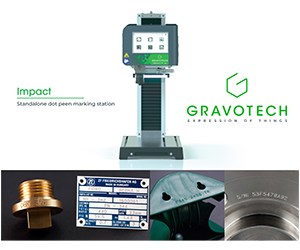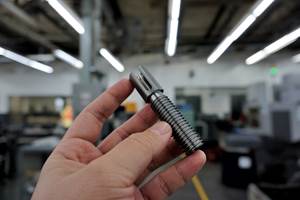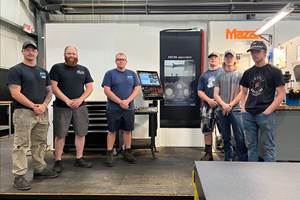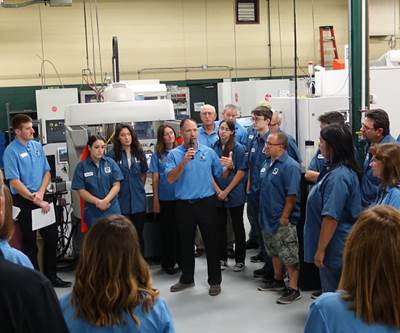What to Include When Developing Your Company Playbook
Like a sports team, your company can also benefit from a written plan.
Football coaches use playbooks to relate plans to their teams. Players are expected to memorize plays along with their personal responsibilities for each play. Only when everyone is in sync with the coach’s design can the team reach its full potential. If players correctly execute responsibilities, the play will succeed. If not, the play will fail. Any breakdown can be linked to a missed responsibility that is covered in the playbook.
Relate this to your CNC environment. You have a firm understanding of what it takes for your CNC operators to succeed. Why not create a company playbook to relate to them what you expect? Like football players, your employees will be expected to study this document. Ideally, every major issue that has arisen over the years will be covered. So, if a mistake is made, it will be because someone has broken a rule in your playbook.
Your company playbook will have the greatest impact on newcomers. They will learn from the mistakes of their predecessors and will be less prone to repeat them. Even experienced CNC operators will benefit since the playbook can provide guidelines for handling complicated or seldom-performed tasks.
To begin, consider mistakes that have resulted in scrapped workpieces, lost time, personal injury or damaged machines. Truly, anything that has negatively impacted productivity is fair game. First and foremost, address those mistakes that have been repeated – possibly many times.
Several issues are probably occurring to you right now. Maybe every newcomer dealing with a given situation for the first time tends to make the same mistake. Maybe an “unwritten rule” you expect everyone to know is repeatedly broken. Or maybe a task is so complicated that even experienced workers tend to mess up from time to time.
Just as football coaches divide their playbooks into logical sections like offense, defense and special teams, so can you categorize your company playbook. Main topics could include safety, procurement, gathering/preparation, workholding setup, cutting tool setup, program loading, first workpiece, production, inspection and any other topic you deem appropriate. Again, target first those areas in which you have experienced worst/reoccurring issues.
Your company playbook will be specific to your company, referencing the documents, software and terminology your company uses. It need not take the form of a set of procedures or replace your current documentation. Rather, it can serve as a set of warning signs, exposing past issues and providing suggestions for avoiding them. Workers must be told to question anything they do not understand.
Here are some examples entries for your company playbook.
Safety
There may have been people injured while working in your company. List injuries, review circumstances, and relate how to avoid them.
Procurement
You may have raw material, such as castings, that looks alike. People sometimes run the wrong one, which can result in a scrapped part. Outline the issue and provide instructions for identifying a casting and aligning it with the workpiece/s it is used to produce.
Gathering/preparation
Gatherers may be lesser-skilled people who sometimes collect the wrong drills, taps, grooving inserts and other components that can look alike. Alert setup people and specify that all small tools must be measured to confirm size.
Workholding
Some of your setup people are much stronger than others and capable of tightening fasteners so tightly that weaker setup people cannot break them loose. Your playbook can provide recommended torque for tightening fasteners – not just for workholding, but for fasteners in all applications.
Cutting tool assembly, measuring and offset entry
Since retention knobs studs vary among machine builders, you may have had issues with incorrectly loaded cutting tools getting stuck in your machines or thrown from them. Specify how retention knobs are identified and require setup people to double check them before loading cutting tools into a machine.
First workpiece
Setup people may be running multiple workpieces before they get one to pass inspection. Outline how trial machining is done for cutting tools that perform critical machining operations.
Production
Jobs that run over multiple shifts sometimes bog down when the next shift operator begins. Provide guidelines for how operators must communicate at shift changes.
Your playbook will likely be a constant work in process. Ideally, anything that can go wrong will be addressed so your first attempt will not cover everything. As mentioned, you should work from the most disastrous/costly to the less important issues. Regardless of how comprehensive it is, you should see dramatic improvements from the fist day you implement it. Eventually, you will start including lesser issues that may not have such a big impact on productivity, but still need improving. And the day will come when you rarely need to add new issues.
Related Content
If the Federal Government Is to Solve the Manufacturing Labor Shortage, it Needs to Start Here
Student-run businesses focused on technical training for the trades are taking root across the U.S. Can we — should we — leverage their regional successes into a nationwide platform?
Read MoreWhen Handing Down the Family Machine Shop is as Complex as a Swiss-Turned Part
The transition into Swiss-type machining at Deking Screw Products required more than just a shift in production operations. It required a new mindset and a new way of running the family-owned business. Hardest of all, it required that one generation let go, and allow a new one to step in.
Read MoreIMTS Takeaways From the Modern Machine Shop Editorial Team
The first in-person IMTS in four years left the MMS editorial staff with a lot to digest. Here are a few of our takeaways from the show floor.
Read MoreTop Shop Builds Upon Employee Ownership for Future Success
In its quest to become the Fox Valley’s best-in-class employer, A to Z Machine has adopted an ESOP, expanded benefits and invested in apprenticeships.
Read MoreRead Next
For This Mold Shop, the Key to Closing the Skills Gap is Emotional Intelligence
Thanks to a culture change founded on a commitment to emotional intelligence, this mold supplier solved its skilled labor problem and increased throughput per employee.
Read More3 Mistakes That Cause CNC Programs to Fail
Despite enhancements to manufacturing technology, there are still issues today that can cause programs to fail. These failures can cause lost time, scrapped parts, damaged machines and even injured operators.
Read More
.jpg;width=70;height=70;mode=crop)
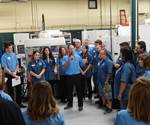













.png;maxWidth=300;quality=90)
.png;maxWidth=300;quality=90)

